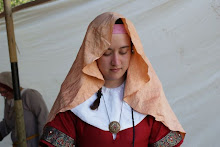Drinking:
- Seeing oneself drink water was a sign of comfort if it was cold, but a sign of sickness if it was hot
- If one was drinking wine, this was a very good sign for the future, providing the glass was small and one was not drunk
- Drinking hydromel, cider or myrtle wine had two meanings depending on the class of the dreamer: if one was rich it fortold good luck. If one was poor, however, as the poor only drank these if they were ill, it fortold sickness to come
- If one drank from a horn cup, this was a very good omen, but a glass cup (which is fragile and transparent) prophecied the undesirable revealing of secrets
- If a sailor dreamed of a glass breaking, this foretold shipwreck. For others, however, it showed a relief from worry and sorrow, especially if the glass had a small opening.
Eating:
- Citron, a sour fruit from a thorny bush, foretold the unemployement of whomever was eating it
- Beets, mallow, and srrel were all very good signs for debtors. These vegetables upset the intestines, and intestines symbolized creditors.
- Carrots, which are pulled up by the roots prophecied bad times for landowners
- Lettuce and squash were very bad omens if a sick person dreamed of eathing them, and meant surgery or amputation
- Melons were thought to promote laziness, and for this reason were a good sign for friendship, but a bad omen for one's work or livlihood
- Onions and garlic were a bad omen if one saw oneself eating them, but good if one was holding them. If one was crowned with a wreath of onions, this was a sign of fortune for the wearer, but bad fortune for those around them in the dream
- Celery was the prize at ancient funerary games. If one was ill and dreamed of wearing a wreath of celery, it meant death
- Legumes were generally an omen of misfortune. Crushed broadbeans fortold discord, lentils foretold mourning, and millet foretold poverty
- Sesame seeds, while a good sign for doctors, was a sign of misfortune for those around them. Crushed sesame, especially in sweets, showed relief from troubles with the law
- Grapes prophecied advantages and favors, peaches and cherries foretold pleasure, but pomegranates were a sign of injury to come
- Eating winter apples was a sign of worry, and sour apples foretold disagreements
- Eating white figs was an omen of good weather, just as black figs predicted bad weather
- Almonds and walnuts were signs of rowdiness and noise
- Eating lamb in a dream foretold a period of mourning, pork and goat were good signs if cooked, poultry showed the success in gaining a lady's' favor.
- Whips were made of bull leather, so eating beef foretold mistreatment and torture if dreamed about by a slave, but was a sign of small jobs for the rich
- Any raw meat was seen as bad (so eating raw poultry showed favors from an undesirable lady)
- Any salt preserved fish or meat showed delays and postponements of family matters
A good secondary source on this, if you want more, is "Ti Etrogan I Byzantini" by Christos Motsias, Kaktos, 1998.

No comments:
Post a Comment